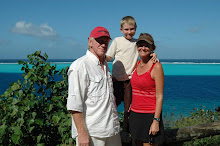18* S 176* 29' W
It's early morning of the day after the night before. Ocean passages seem to stimulate the writing urge. I'm sure it's more from boredom rather than any great philosophical awakening!
We left the Kingdom of Tonga at noon yesterday (Tuesday here, Monday for most of you). We knew the weekend had come and gone because the internet had a bunch of NFL week 1 scores. Go Pack Go (Oh come on now Brett, enough is enough already).
It always takes a day or two to readjust to life at sea after being in protected anchorages for an extended period. We had been in Tonga for almost 6 weeks and grown comfortable with a normal daily schedule of doing boat maintenance, Bear's schooling, and afternoon adventures with friends from other boats. As one starts to prepare for another passage the weather becomes the focal point and we try to wait for a relatively docile forecast. The sailors want ideal wind strength from the perfect direction with gentle seas. We "stink boaters" would like conditions similar to an early July morning on Eagle Lake when you can hear a goose fart across the lake.
No matter what you want, ideal passage weather is rare and short lived. For most of the time since we left Mexico in April we have been in tropical trade wind regions. This is generally supposed to be 15-20 kt winds from the E or SE accompanied by 4-8' seas. This is nearly ideal for the sailors and pretty comfortable for us, when it actually happens. We left Tonga with a 2-3 days prediction for 'normal' trade winds and looked forward to a good crossing. Yesterday the conditions were as forecasted and we were able to get comfortable and readjusted with the continuous rolling of the big blue sea. As the sun went down last night, we experienced a number of rain squalls accompanied by 30-35 kt winds. Rain squalls and thunderstorms at sea develop in a number of different ways. Sometimes they seem to just pop up out of no-where. Other times you can see them for what seems like hours as they slowly approach, engulf you, and then slowly drift away. Night storms are a different experience. On a cloudy night there is little to see outside the boat and we travel in our own little world. There is a Star Wars feeling with the red glow of all the instruments and navigation equipment and the constant sweep of the radar screen. We often go days without seeing another boat or even a blip on the radar.
Last night was one of those dark and stormy nights where the radar was lit up like the doppler radar at your local TV station. On our boat radar, rain shows up as bright yellow or orange depending on intensity. As squalls develop and approach, the soft gentle red glow of the screen comes alive with bright swaths like paint had been splattered on glass. It becomes hypnotic watching these bright blobs slowly approaching. We are sometimes tempted to try to outsmart the squall and change direction to avoid it, but that is futile. There is no way to know how strong they are or if they are going to change direction, grow bigger, or sometimes just evaporate. As you stare at the screen it is easy to convince yourself that the storm is stalking you in slow motion, but the weather - like the sea - is impersonal and unaware of our presence or concerns. When the leading edge arrives with the initial blast of wind and rain our boat seems to suddenly get very small. There is no such thing as a "big enough" boat on the open ocean.
Approaching squalls with lightning are a different thing and give heightened worries. A close strike could wipe out the electronics we are so dependent on for navigation and operating the boat. Even the basic controls are electronically controlled. An approaching thunder storm gives additional warning besides the bright splash on the radar as we watch the light show in the clouds. There are a lot of theories about what a small boat should do when lightening is approaching. Our basic preparation includes turning off redundant navigation equipment, disconnecting backup radios, and shutting down electrical breakers to unnecessary equipment. None of this would help in a direct hit, but our hope is to minimize damage and have backup systems for basic functions. We are also equipped with what amounts to a lightening rod that goes from the top of the mast directly down to the sea water. So far, we have been lucky and have not seriously tested our theories or preparation.
Last night was another night that we got to go through our preparation drill. Luckily, the light show stayed in the clouds, the wind and rain came and went, and by the time it was over we could sit back and reflect on how beautiful and powerful nature can be.
E

